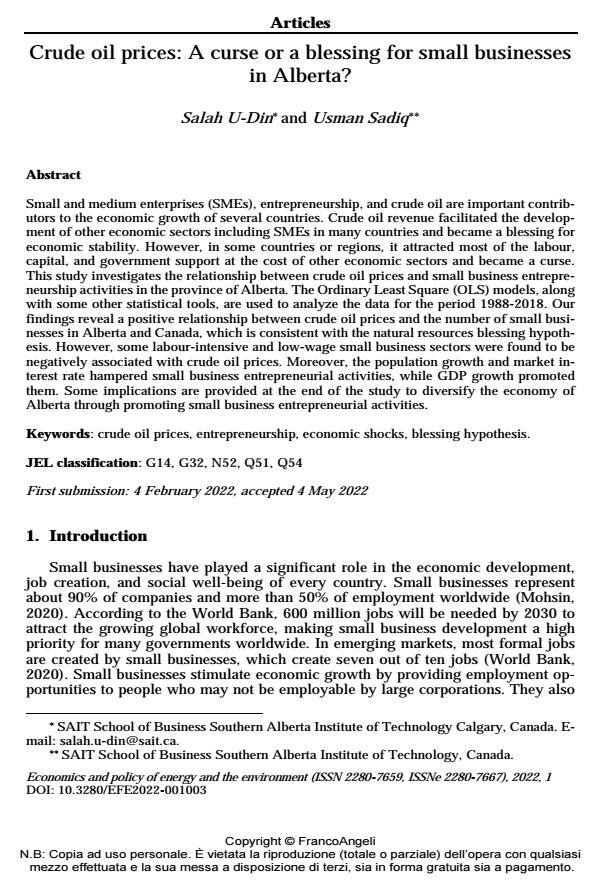Crude oil prices: A curse or a blessing for small businesses in Alberta?
Journal title ECONOMICS AND POLICY OF ENERGY AND THE ENVIRONMENT
Author/s Salah U-Din, Usman Sadiq
Publishing Year 2022 Issue 2022/1
Language English Pages 18 P. 33-50 File size 164 KB
DOI 10.3280/EFE2022-001003
DOI is like a bar code for intellectual property: to have more infomation
click here
Below, you can see the article first page
If you want to buy this article in PDF format, you can do it, following the instructions to buy download credits

FrancoAngeli is member of Publishers International Linking Association, Inc (PILA), a not-for-profit association which run the CrossRef service enabling links to and from online scholarly content.
Small and medium enterprises (SMEs), entrepreneurship, and crude oil are important contrib- utors to the economic growth of several countries. Crude oil revenue facilitated the develop- ment of other economic sectors including SMEs in many countries and became a blessing for economic stability. However, in some countries or regions, it attracted most of the labour, capital, and government support at the cost of other economic sectors and became a curse. This study investigates the relationship between crude oil prices and small business entrepre- neurship activities in the province of Alberta. The Ordinary Least Square (OLS) models, along with some other statistical tools, are used to analyze the data for the period 1988-2018. Our findings reveal a positive relationship between crude oil prices and the number of small busi- nesses in Alberta and Canada, which is consistent with the natural resources blessing hypoth- esis. However, some labour-intensive and low-wage small business sectors were found to be negatively associated with crude oil prices. Moreover, the population growth and market in- terest rate hampered small business entrepreneurial activities, while GDP growth promoted them. Some implications are provided at the end of the study to diversify the economy of Alberta through promoting small business entrepreneurial activities.
Keywords: crude oil prices, entrepreneurship, economic shocks, blessing hypothesis.
Jel codes: G14, G32, N52, Q51, Q54
Salah U-Din, Usman Sadiq, Crude oil prices: A curse or a blessing for small businesses in Alberta? in "ECONOMICS AND POLICY OF ENERGY AND THE ENVIRONMENT" 1/2022, pp 33-50, DOI: 10.3280/EFE2022-001003